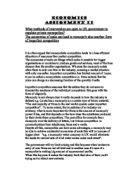What are the arguments in favour of anti-monopoly legislation and under what conditions might monopolies be allowed to exist?
Drakakakis Emmanouil
Spring Term 2003
Department of Management
Economics Essay #2
1. What are the arguments in favour of anti-monopoly legislation and under what conditions might monopolies be allowed to exist?
Before discussing the arguments in favour of anti-monopoly legislation and the conditions that a monopoly would be allowed to exist it is important to define monopoly and its market structure. It would be easy to define monopoly by considering the existance of only one firm in a certain industry. but the definition of industry is not always that specific. For example, BMW might have a monopoly in a specific type and design of a car but it certainly does not have a monopoly in the whole car industry area. Or 3M might hold a patent certificate and certainly a great slice of the Post-It notes but that does not mean that the consumer cannot access stick-on notes almost identical to the post-it's (and maybe in a smaller price). This is a vague definition of monopoly but a firm can be more certain about its power of monopoly when assesing the quantity and closeness of alternative products supplied by other companies. For example, electric supply in Greece is provided by only one company and until now its rivals, that would be solar, wind, gas and alternative forms of energy hardly can compare with it at the moment. Following the initial definition of the monopoly there is only one firm in the industry so the firm's demand curve is the industry's demand curve. The demand would be inelastic relatively at each price because the consumer has no option: buy the product at a higher price or not have the product at all. The actual elasticity will vary according to the relevant products supplied by other firms. For example if there are many and various stick-on notes of similar quality of those provided by 3M then demand would be more elastic for this product. A monopoly position in the industry is not created and maintained on its own though. There should be several barriers of entry for new firms high enough to block the entry of new firms. There are several types of barriers: (a) Product differentiation and brand loyalty. When a product is of such quality and type and is the only one that is associated with the customer for a specific purpose. This barrier can occur in a market where even two industrys are accumulating all the available economies of scale because the cost worries the customer less than the quality and fitness of the product. (b) An economy of scale. This is a situation where the industry cannot support more than one producer. Under these conditions, if two firms each charging the same price and supplying half the industry output they would both face a downward sloping demand curve. They would not be able to cover costs whatever the price. (c) Established monopoly firm. This barrier of entry refers to a firm capable of doing everything in the most efficient way in order to prevent the entry of a competitor. Production and marketing skills would be high, techniques, reliable and cheap suppliers would be commited, finance would be cheap and all that for a lower cost curve that would render any other firm incapable to compete. (d) Owing key factors of production and/or distribution outlets. an embargo of a key ingredient of a drug to other companies who want to build it or owning the means of access to the customer (outlets) has obvious effects. (e) Legal protection. Patents, tariffs and other charges concerning the product discouraging future competitors. (f) Mergers and takeovers of all future competitors. (g) Agressive economic tactics can be of use as the monopolist firm has advantage over its new competitors to lose for a while but in general maintain its reign in the area ( this can apply to intimidation of legal or illegal form).







